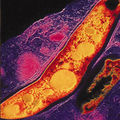Pedicornwallification
Pedicornwallification is a rare but horrifying disease in which the feet of sufferer are transformed into Cornish Pasties. It occurs mostly in young males between the ages of 15 and 25, particularly amongst Cornish tin miners. It is thought to be linked to the even rarer Devoniamanus, where the hands take on the form of scones covered with strawberry jam and clotted cream.
Etymology[edit | edit source]
The term pedicornwallification bears its routes from a great doctor of the 19th-century from Isambard Kingdom Brunel. The whole term can be split into its constituents, the ancient word for feet, 'pedi', and Cornwallifus which translates roughly to 'of sultry pastry'.
History[edit | edit source]
The first recorded reference to pedicornwallification can be found in the story of the nativity of our lord Jesus Christ. The three wise men responsible for bringing pastry as a gift were 'forever strucketh with a delicious blight'.
Diagnosis[edit | edit source]
The effects of pedicornwallification are far more devastating to humans than any other species. This is due to how socially unacceptable it is to have pasties instead of feet, whereas in the animal kingdom it is quite the boon.
Effects[edit | edit source]
The onset of the disease is sudden and can cause the sufferer to go into shock. The transformation has many negative effects on the human body such as limiting blood flow through the legs, loss of nerve tissue, severe reduction in mobility, muscle damage, bone damage and increased risk of Pigeons eating your feet. Ultimately this can cause to death.
Symptoms[edit | edit source]
Aside from turning feet into pasties, early symptoms may include an increased enjoyment in playing Microsoft Flight Simulator, a lack of dress sense and the misplaced belief that the sufferer is Canadian. Eh?
Prevention[edit | edit source]
A well known method of prevention is to always ensure the use of a prophylactic device when conversing with a sufferer. However, as always, the best way to prevent contracting the disease is to avoid conversation altogether.
Treatment[edit | edit source]
There is no know cure for this disease, although a prescription of ketchup or HP sauce is thought to reduce the effects. Research is ongoing at the University of Bristol, but so far with little success.



